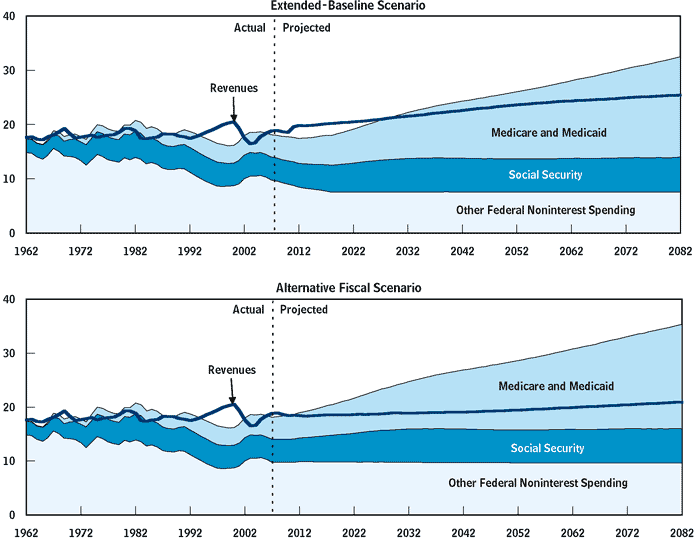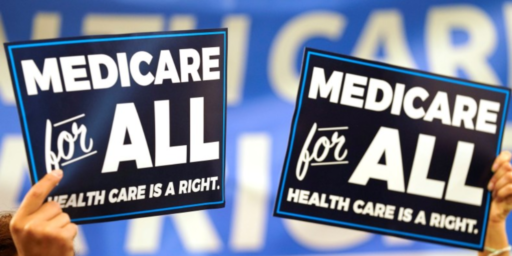Health Care Spending
In the comments to this post (of all things about the spectacle that is Paris Hilton going to serve 40 days) commenter Anderson pointed to this post by Kevin Drum. It is a short post and quoting only a part of it would likely not do justice to the post, so here it is in its entirety,
THE REAL PROBLEM….What Ezra says. Medicare isn’t the problem. Healthcare is the problem. If we don’t figure out a way to contain the overall rise of medical spending, it really doesn’t matter much exactly how those dollars get spent.
Needless to say, I think the only serious opportunity to rein in those costs without a revolt of the middle class comes from a universal system regulated by the feds. The liberal argument for this is that it provides decent healthcare to everyone and allows greater freedom of choice for consumers. The conservative argument is that it makes medical costs more transparent. Right now, consumers have essentially no say in the cost of health insurance. They just pay whatever their employer makes them pay and then use as much medical care as they want. A national system, however, is limited by how much people are willing to pay in taxes. That provides a stronger motivation for cost control than anything we have now.
Yes and no. Yes health care spending is the problem, but I think it is unrealistic to pretend that government policies are not in some way playing a role in the growth rate of spending, and further more that we need to be pretty darned careful in how we go about providing universal health care (if that is indeed the right answer–and even if it isn’t it seems to be the way everybody wants to go–who cares if it turns into a financial blackhole).
For example, government policy to exempt health care benefits provided by employers form taxation has resulted in a distortion that favors expenditures on health care as well as expanding benefits to cover more and more things. At least until costs started to rise drastically and employers are no looking at cutting back on said benefits. Whoops. Possibly a dumb policy by the boys in D.C.?
Then there is the massive subsidies provided to one of the segments of the population that consumes huge amounts of health care and usually at the end of such consumption they up and die anyways–i.e. the elderly. Medicare, as with all subsidies, increases the demand for health care and that will increase prices. This isn’t rocket science here, this is just simply supply and demand. Increase the demand, ceterus paribus and you get an increase in prices. Whoops, possibly a dumb policy by the boys in D.C.?
Another example is the Elderly Prescription Drug Program which Drum himself has pointed out is going to end up costing far more than initial estimates indicated. As with Medicare this policy is basically a subsidy as well, and with increased demand you will get increased prices as well. Another brilliant policy by the boys in D.C.?
The larger point to all of this is that, perhaps government isn’t all that great at coming up with policies that try to manage a problem in an active way. That is, I’m not necessarily opposed to government policies in regards to health care, but that the role government plays is a much more limited one than we have seen in the past.
If you look at places like England and Canada which have government controlled health care you find that in both places the health care expenditures are on the verge of becoming financial black holes. Don’t take my word for it, consider what Max Gammon has written about health care spending in the U.K.,
Bureaucratic monsters arising among organisations whose survival depends upon their persuading customers to buy their products are sooner or later destroyed or dismembered by their competitors. However, in a protected environment, shielded from competition, a bureaucracy will grow indefinitely and approach ever more closely the black hole state, in which externally supplied resources are entirely consumed by its furious internal activity. And this is what is happening in the NHS.
I know, I know, it is clearly crazy talk. Health care services in the U.K. are just wonderful, why those mandantory wait times were not instituted for financial reasons, no not at all. And the lack of MRIs and CT in Canada is actually based on a sound medical rationale and not based on budgetary issues. And despite their health care system, obesity is also on the rise in Canada as well. My point isn’t that health care in Canada and the U.K. is worse than the U.S., but that an ill-considered policy on health care can lead to undesirable outcomes. Simply moving to univerals health care, no matter what the details, could be worse than sticking with what we currently have (which is indeed a mess).
So Kevin is partly right, but also partly wrong. Further, where he goes wrong is probably the greater problem. More government is probably not the answer here.






The problem faced by writers of Steve’s stripe is that, yes, there’s a few bad examples of Government Health Care (although not as bad as he paints them), but there’s also many more _good_ examples of same (France, Germany, etc.) while there’s basically no good example out there of good Libertarian Health Care, and many of us know that it’s for good reason.
One thing most of the good examples seem to have in common is that the government uses the market where it makes sense, rather than pretending that it’s not an excellent efficiency machine. But, of course, we have to pretend otherwise because everything those governments do must be bad, because Rush calls them socialists.
Of course, more government is rarely the right answer to any question. Any chance a single payer system run by the federal government would resemble the way VA hospitals are run? Or are we happy with that?
Once again Steve demonstrates his faulty logic and comprehension.
First of all Steve, Medicare does not ‘increase the demand’ for health care. The demand for health care, at any age group including those those age 65 and older, exists independent of any method of paying for the care.
Your problem is that you confuse things like ‘eye care’ with things like ‘i-pods’
It is true that if we had a program to provide every teenager with a free i-pod the demand for i-pods would skyrocket.
In spite of what you think, however, it is not true that providing eye care for those over age 65 increases the demand for cataract surgery. Only those who actually NEED cataract surgery are going to submit to having their eyeball cut open, their cataract clouded lens cut out, and replaced by an artificial lens. You can even make it free and you will not convince a single senior to have lens replacement surgery than the ones who NEED it.
When costs go down, demand goes up. Or had you forgotten that marketing basic? The number of actual physical illnesses doesn’t change, that much is true. However given that it’s free a little hypochondria never hurts, so long as you’re not paying for it. After all, the doctor’s got those pills which make everything better. Ever wonder why we are the most over prescribed over medicated nation on the planet?
I’m afraid health care demand has a connection to who pays for it. Maybe not the cataract patient but what about the mom who takes the kids to the doctor every time they have a sniffle? The overweight sixty-something that gets a new scooter rather than lose weight since they get the government to pay for it (and makers advertise the fact as a selling point)? What about the doctors who overtreat knowing that a check will come and no one will complain about the cost?
I expect the reason we haven’t seen a good libertarian health care system is modern medicine as we know it came after the WWII inspired health insurance boom. We haven’t seen a failure of libertarian health care either.
Problem is that discretionary health consumption like that is a drop in the tinest bucket in the ocean compared to end-of-life spending and preemies. And such unnecessary health expenditures are overwhelmed by health expenditures which SHOULD be made but aren’t (on sensible preventative care, for instance, or seeing a primary care doctor instead of the ER) because of the way we finance.
Bithead,
You are confusing things like eye care with things like i-pods. There is a difference.
Not recognizing that difference leads people like you to say things like ‘we are the most over prescribed over medicated nation on the planet’. As if you are in any position to know.
Looking at it closely what you really are saying is: ‘people should just suffer their illnesses and die’.
But suffering and death are not things that are subject to your economic analysis. They are, like life itself, independent of whatever economic system is in place at the time. There is no demand curve for life and health that fits into the acedemic models people like you and Steve like to use.
You may one day realise this.
This is not true. We have seen the libertarian preferred free market fail to match the health result of what can be provided through government sponsored programs throughout most of human history and throughout the entire world.
Medicare did not drive out the free market, it filled a need that remained unmet for over 200 years in this country.
M1EK,
I haven’t read much about Germany’s health care, but I have read about France’s and it requires a fair amount of out-of-pocket expenses. As such, it isn’t comparable to things like the Canadian system or England’s NHS. And I’d suggest that part of the reason it is working better than most is that out-of-pocket expenses, something that many here in the U.S. seem to oppose.
Ken,
When you subsidize something you get more of it.
M1EK,
I disagree. How much does it cost to have a baby at the local hospital? $5,000? How many kids are born each year. That is $5 billion for every 1 million kids born each year. If there are 4 million born each year, then that is $20 billion each year. That works out to quite a bit of money and that certainly isn’t something that should be covered under health insurance as it is a voluntary activity.
So the tiniest drop in the biggest of buckets is probably a bit of an over-statement. Add on other things like what Steve Plunk is talking aobut and maybe we get to 2% of total spending. Sure not a huge amount, but it is still about $40 billion dollars. Not exactly chump change.
ken,
No, but maybe we shouldn’t be spending huge amounts of money at the end of life sometimes. We don’t have to let them suffer, but at the same time trying to extend the life for the 88 year old man on a breathing vent for 3 more months…may not be in his best interest or ours.
Incidentally, where did you come down on the Terri Schaivo case?
Really, got anything to back that up? Prior to WWII life expectancy was rising, health care was getting better, and so forth. Yet we are to believe it was an abject failure save for the way to get around wage controls during WWII? Sure, I believe that.
Actually, it was a welfare program to the largest block of voters out there and has cost far more than anybody thought at the time…kind of like Bush’s elderly prescription drug program.
Any chance a single payer system run by the federal government would resemble the way VA hospitals are run?
God I hope not. Our VA experience to date can hardly rank up there with excellent healthcare.
Worse? Not bloody likely.
As bad? Possibly.
As above there are a lot of success stories for government paid helath care. There are zero success stories for private insurer paid health care.
some>0
Do the math.
You know better than that. A change in supply does not have to correspond to a change in demand, it depends entirely on how elastic the market is for that particular item.
Health care (like gasoline) is an example of a product that shows very little change in demand for a given change in supply/cost. People do not suddenly need an appendectomy just because you cut the price. They needed one or they didn’t.
Let’s use your birth cost example: do you really believe the cost of birthing a child will even in the slightest affect the rates of pregnancy? It won’t. People will go right on have unprotected sex regardless and babies will continue to be concieved. And those babies will have to come out regardless of how much it costs.
Health care is not a field that reacts like the curves they show in Econ 101.
Quality of health care seems to be proprotional to costs. The only way to get better quality health care is with more expensive R&D and more expensive diagnosis tools. The problem with government health care isn’t that it will increase demand, it’s that it will cap costs, thus cutting the supply of the more expensive diagnosis tools (who’s going to pay for them?) while at the same time killing off R&D incentives (who’s going to pay $100 million to develop a medicine that you have to sell at a price cap?).
Another interesting link that shows some hidden impacts on health care costs Million-Dollar Murray
And
Insurance and the Emergency room
The link above shows that When you subsidize something you get more of it absolutely applies to medicine.
Post on an ER physicians blog show that When you subsidize something you get more of it absolutely applies to medicine.
Link for the story above. Spam filter did not like some of the words in the original link header
ER overuse
Tlaloc,
I’ll give you bonus points for using elasticity, but you are mistaken. It isn’t supply that is affected by the subsidy, but demand, hence your comment is way off. That is a subsidy shifts the demand curve, that is demand increases at all prices. Unless supply is perfectly elastic, there will be an increase in total output and an increase in prices.
Really? Aside from France’s pseudo-government run health care what else is there? Surely not someting from Cuba or North Korea I hope. Since M1EK has mentioned Germany, I’ve been trying to dig stuff up via google. Haven’t found much yet, but the means of financing its system strikes me as being highly regressive–a payroll tax. Physician’s fees have been capped since 1986…hmmm I haven’t seen anything indicating this yet, but the first thing that popped into my mind was what about a potential shortage of doctors as people looked to more lucrative career options. And I haven’t found anything about the rate of increase in health care costs, but if it is anything higher than the growth rate of GDP then that system is basically f*cked as ours, it just might take them longer to realize it.
Seriously, I don’t see what all the furry is about. In the post of mine I linked too I favored mandantory isurance for everybody (like with Clinton Care–i.e. everybody is covered), that there is some subsidies for lower incomes at least, but that we break the supply constraints on health care suppliers–i.e. doctors. End the asymetrical treatment of employer provided health benefits vs. health benefits purchased by the individual.
Or is it simply that those who thing government provided health care really does mean it is free and that everybody gets a pony too?
This goes back to the efficiency argument. The average baby whose parents up at the ER ready to pop incurs a potentially far higher cost (orders of magnitude higher) than they would had they been fully covered (prenatal visits and the like). Not covering childbirth seems like low-hanging fruit to single guys and/or ideologues, but it’s simply not practical in _any_ health care system.